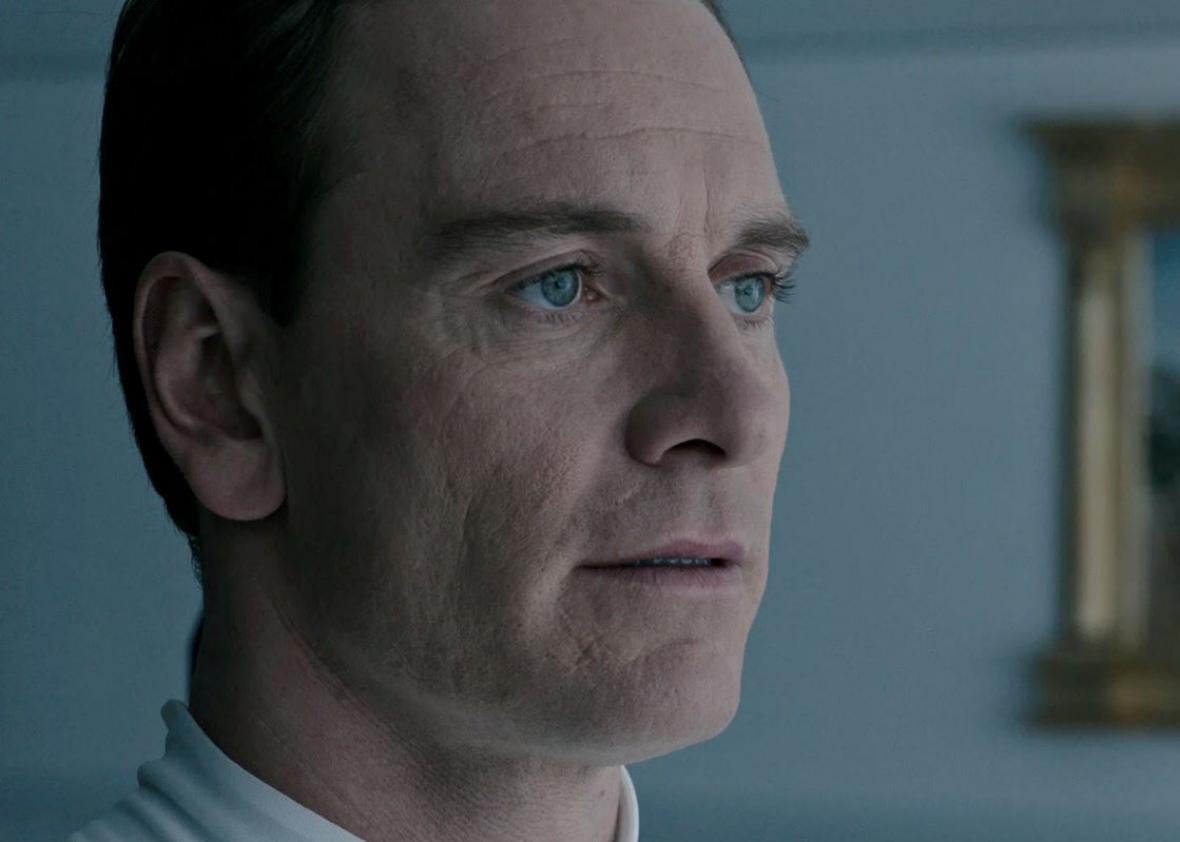This post contains spoilers for Alien: Covenant.
In Alien: Covenant, Ridley Scott pulls a sneak attack. Prometheus, his first Alien film since the 1979 original, was a comically ambitious origin story of both the franchise’s monsters and of humanity itself. To open Covenant, his new follow-up, Scott presents a dreamy conversation about existence accompanied by an android on piano—before promptly reverting to the series’ genre DNA, which bleeds from the victims in buckets.
Yet that isn’t the sneak attack. Old fans may initially find Alien: Covenant to be a return to the series’ elemental horror roots, but it isn’t long before it’s clear that Scott and his team of writers are up to … something else. Something that involves Michael Fassbender seducing Michael Fassbender with a flute lesson. Something that includes deep serpentine stares, existential cooing, and the line “I’ll do the fingering.” Something that begins as WTF subtext but, to my great delight, quickly reveals itself as all-out text. By the time Fassbender plants a kiss on his own doppelganger, Alien: Covenant has taken a hard turn from uncanny valley to a twincest fever dream, or a parable of toxic self-regard, or something. What is clear is that Fassbender gets gayer than any actor I can remember in a major blockbuster, and he does it with himself.
To set the scene, we must back up a moment. You’ll recall that, in Prometheus, Fassbender played David, a sleek, diligent, obviously sinister android. In a movie full of curiosities, Fassbender had a riot pivoting between bitchy robo-quips and ominous moments of self-discovery. On a deep-space mission, he was a pawn in a dying billionaire’s quest for eternal life (I think? Who really remembers?), but he also began to experiment on the ship’s crew with alien DNA, a sign of the burgeoning articial intelligence consciousness that is ultimately at the heart of these Alien prequels.
At the end of Prometheus, David was down to a severed head, but by the time he quite literally bounds into the frame in Alien: Covenant, hooded and fierce, it’s obvious he’s learned the ways of the extraterrestrial jungle. This time, an unwise crew of space colonizers has arrived to yet another deadly planet, with David’s next-gen succesor on board. This “synthetic,” rebranded as Walter, is played with more pronounced animatronic stiffness by Fassbender, which the movie hints was a corrective to earlier models that behaved “too human.” David, marooned on the planet, comes to the crew’s ostensible rescue after it begins to fall prey to familiar chest-splaying ailments. When he locks eyes with Walter for the first time, our first taste of Fassbender-on-Fassbender magic, there are clearly fireworks. And this is where things get weird.
It’s funny: Alien: Covenant made minor gay blogosphere headlines when it slipped that the movie would include the franchise’s “first gay couple.” In the new blockbuster tradition of Star Trek Beyond, Independence Day: Resurgence, and, yes, Beauty and the Beast, the couple’s role turns out to be vanishingly thin, involving two military roughs (Demián Bichir and Nathaniel Dean) who don’t show real physical affection for each other until one of them has his torso ripped open. (To be fair, that’s also true of most of the movie’s straight couples.) It’s barely there, the kind of moment that will, by design, turn a few queer heads and go unnoticed by everyone else. Somewhere, a studio executive rests easy.
But then we get to the saga of David and Walter. After their meet-cute, the dueling Fassbenders pair off from the group, comparing their designs (ahem) and chatting about the fate of the universe. The movie is clearly having fun at this point, the giddy pleasure many projects take in pitting a top-of-his-game actor against himself in twin roles. As David lets more and more of his plan slip to Walter, however, the tension between the two morphs in more ways than one. In a rather erotic sequence that nearly brought down the theater where I saw it, David—who, as an earlier model, has more artistic ability to “create”—teaches Walter how to play a hymn on the flute. David leans over Walter, whispers encouragement in his ear, and as Walter begins to blow, offers that instantly immortal line: “I’ll do the fingering.”
Although the movie is careful to provide female crew members to interest both David and Walter, it is quite clear who is sharing the real love story. Nestled between exploding ribcages and snarling octopus creatures, an interstellar romance plays out, brought home by Fassbender’s cheeky but tender take on each character. David, who develops into a Lecter-ish dandy villain sneering with delight as his evil plan is realized, shows touching vulnerability with Walter, the only other deranged android he’d ever want by his side. “No one will ever love you like I do,” he tells him, and offers him a future where they would be maverick kings reigning over the universe’s new order. If there was any doubt, in a moment I can only describe as exclusively gay, David leans into Walter for a kiss, a bit of Fassbender self-love that left my audience shrieking in delight.
Whenever I write about any whiff of homoeroticism in a mainstream blockbuster, I can rely on emails and tweets telling me I am making things up. In this case, I sincerely look forward to how audiences expecting acid-burned skulls and gyrating aliens react when the movie pauses for its bouts of affirmational android affection. In the meantime, I can confidently say to my fellow Fassbender fans, who have dutifully shipped his Magneto with James McAvoy’s Professor Xavier in the X-Men movies for too many years: Look no further. This one is for you.
